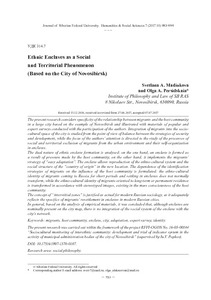Показать сокращенную информацию
Ethnic Enclaves as a Social and Territorial Phenomenon (Based on the City of Novosibirsk)
| Автор | Madiukova, Svetlana A. | en |
| Автор | Persidskaia, Olga A. | en |
| Автор | Мадюкова, С.А. | ru_RU |
| Автор | Персидская, О.А. | ru_RU |
| Дата внесения | 2017-07-29T02:01:36Z | |
| Дата, когда ресурс стал доступен | 2017-07-29T02:01:36Z | |
| Дата публикации | 2017-07 | |
| URI (для ссылок/цитирований) | https://elib.sfu-kras.ru/handle/2311/33651 | |
| Аннотация | The present research considers specificity of the relationship between migrants and the host community in a large city based on the example of Novosibirsk and illustrated with materials of popular and expert surveys conducted with the participation of the authors. Integration of migrants into the socio-cultural space of the city is studied from the point of view of balance between the strategies of security and development, while the focus of the authors’ attention is directed to the study of the processes of social and territorial exclusion of migrants from the urban environment and their self-organization in enclaves. The dual nature of ethnic enclave formation is analysed: on the one hand, an enclave is formed as a result of pressure made by the host community, on the other hand, it implements the migrants’ strategy of “easy adaptation”. The enclave allows reproduction of the ethno-cultural system and the social structure of the “country of origin” in the new location. The dependence of the identification strategies of migrants on the influence of the host community is formulated: the ethno-cultural identity of migrants coming to Russia for short periods and settling in enclaves does not normally transform, while the ethno-cultural identity of migrants oriented to long-term or permanent residence is transformed in accordance with stereotyped images, existing in the mass consciousness of the host community. The concept of “interstitial zones” is justified as actual for modern Russian sociology, as it adequately reflects the specifics of migrants’ resettlement in enclaves in modern Russian cities. In general, based on the analysis of empirical materials, it was concluded that, although enclaves are nominally present on the city map, there is no integration of the social system of the enclave with the city’s network | en |
| Аннотация | Специфика взаимоотношений мигрантов и принимающего сообщества в крупном городе рас- смотрена на примере Новосибирска и проиллюстрирована материалами массового и эксперт- ного опросов, проведенных при участии авторов. Интеграция мигрантов в социокультурное пространство города рассмотрена с точки зрения баланса между стратегиями безопасно- сти и развития, при этом фокус внимания авторов направлен на исследование процессов со- циально-территориального исключения мигрантов из городской среды и их самоорганизации в анклавах. Рассмотрена двойственная природа формирования этнического анклава – с одной стороны, анклав формируется как результат воздействия принимающего сообщества, с другой сторо- ны, в нем реализуется стратегия адаптации самих мигрантов «по легкому пути». Анклав по- зволяет локально воспроизводить этнокультурную систему и социальную структуру «страны исхода» на новой территории. Зафиксирована зависимость идентификационных стратегий мигрантов от влияния принимающего сообщества: этнокультурная идентичность мигран- тов, приезжающих в Россию на короткий срок и селящихся в анклавах, минимально подверга- ется трансформации, в то время как этнокультурная идентичность мигрантов, ориентиро- ванных на долгосрочное или постоянное проживание, трансформируется в соответствии со стереотипными образами, существующими в массовом сознании принимающего сообщества. Понятие «интерстециальные зоны» обосновано в качестве актуального для современной от- ечественной социологии, так как адекватно отражает специфику процессов анклавного рас- селения мигрантов в современных российских городах. В целом, на основе анализа эмпирических материалов сделано заключение о том, что при но- минальном присутствии на карте города, объединение социальной системы анклава с сетью города отсутствует | ru_RU |
| Язык | en | en |
| Издатель | Сибирский федеральный университет. Siberian Federal University | en |
| Тема | migrants | en |
| Тема | host community | en |
| Тема | enclave | en |
| Тема | city | en |
| Тема | adaptation | en |
| Тема | expert survey | en |
| Тема | identity | en |
| Тема | мигранты | ru_RU |
| Тема | принимающее сообщество | ru_RU |
| Тема | анклав | ru_RU |
| Тема | город | ru_RU |
| Тема | адаптация | ru_RU |
| Тема | экспертный опрос | ru_RU |
| Тема | идентичность | ru_RU |
| Название | Ethnic Enclaves as a Social and Territorial Phenomenon (Based on the City of Novosibirsk) | en |
| Альтернативное название | Этнические анклавы как социально-территориальный феномен (на примере г. Новосибирска) | ru_RU |
| Тип | Journal Article | |
| Тип | Published Journal Article | |
| Контакты автора | Madiukova, Svetlana A.:Institute of Philosophy and Law of SB RAS 8 Nikolaev Str., Novosibirsk, 630090, Russia; sveiv7@mail.ru | en |
| Контакты автора | Persidskaia, Olga A.: Institute of Philosophy and Law of SB RAS 8 Nikolaev Str., Novosibirsk, 630090, Russia; olga_alekseevna@mail.ru | en |
| Контакты автора | Мадюкова, С.А.:Институт философии и права СО РАН Россия, 630090, Новосибирск, ул. Николаева, 8 | ru_RU |
| Контакты автора | Персидская, О.А.:Институт философии и права СО РАН Россия, 630090, Новосибирск, ул. Николаева, 8 | ru_RU |
| Страницы | 983-994 | ru_RU |
| Журнал | Журнал Сибирского федерального университета. Гуманитарные науки. Journal of Siberian Federal University. Humanities & Social Sciences;2017 10 (7) | en |

